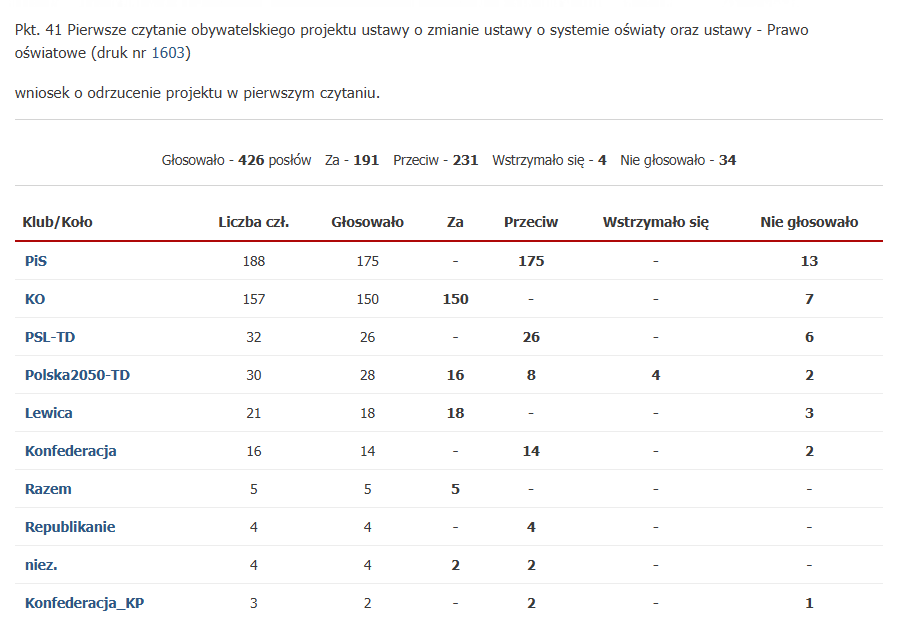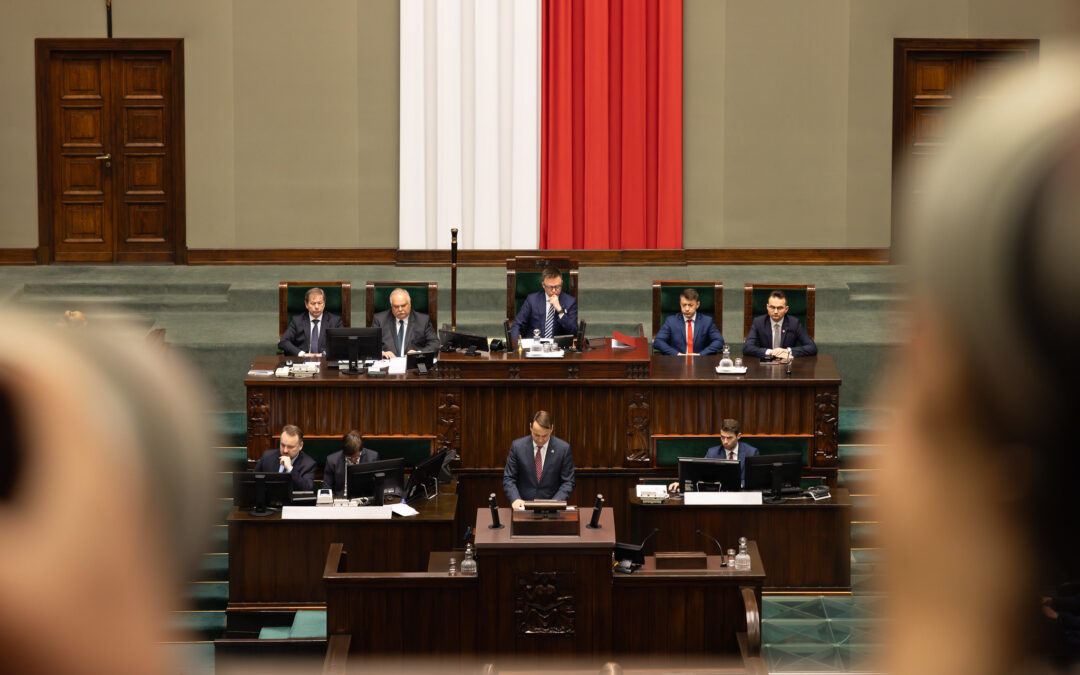Keep our news free from ads and paywalls by making a donation to support our work!

Notes from Poland is run by a small editorial team and is published by an independent, non-profit foundation that is funded through donations from our readers. We cannot do what we do without your support.
Poland’s parliament has voted to allow a bill making it compulsory for children in schools and preschools to attend either Catholic catechism or ethics classes to pass to the next stage of legislative work.
The decision to allow the bill to proceed was made after a split in Prime Minister Donald Tusk’s ruling coalition, with some of its more conservative MPs joining the right-wing opposition to vote the measures through.
However, the legislation has not been given final approval. It will head to the parliamentary education committee for further work before potentially coming back to the chamber for a vote on its final form.
🔴 Sejm skierował do dalszych prac obywatelski projekt ustawy wprowadzający obowiązkowe lekcje religii lub etyki w polskiej szkole autorstwa Instytutu Ordo Iuris
🔴 Projekt zyskał poparcie ponad pół miliona osób pic.twitter.com/m8Jvs7uDo1— Instytut Ordo Iuris (@OrdoIuris) September 26, 2025
The bill in question is a so-called “citizens’ legislative initiative”, which is a type of proposed law that can be submitted to parliament by outside groups if it receives at least 100,000 public signatures in support of it.
The legislation – titled “Yes for religion and ethics in schools” – was written by Ordo Iuris, a prominent conservative legal group, and the Association for Lay Catechists (SKS). It received support from the church and was signed by over 500,000 people before being submitted to parliament.
Its authors expressed opposition to decisions by Tusk’s government to halve the teaching of Catholic catechism in Polish schools from two hours to one hour a week, as well as to remove the subject from end-of-year grade averages.
Formally known as “religion”, that subject is hosted and funded by Polish public schools but with teachers and curriculums chosen by the Catholic church. It is optional, though most pupils attend. Schools also offer optional ethics classes, which are secular but in some cases taught by catechists.
The Polish government has enacted a regulation halving the number of state-funded religion classes in public schools to one hour per week.
The change, criticised by the Catholic church as "unlawful", will come into force on 1 September 2025https://t.co/jj8nHDgLHd
— Notes from Poland 🇵🇱 (@notesfrompoland) January 20, 2025
Under the newly proposed law, it would be compulsory for children to attend two hours of either religion or ethics classes per week. This could only be reduced to one hour per week with the consent of the local bishop.
Ahead of Friday’s vote in the Sejm, the more powerful lower house of parliament, deputy education minister Katarzyna Lubnauer told the chamber that her ministry views the proposed law “negatively”.
“This law violates the principles of the state’s ideological neutrality and restricts parents’ constitutional right to raise their children in accordance with their own beliefs,” said Lubnauer. “Polish schools should be a place where every child – believing and non-believing, practising and non-practising – feels good.”
However, the chairman of SKS, Piotr Janowicz, argued that “the bill does not discriminate against any group or individual, but provides equal opportunities and teaches citizens mutual respect and living together in harmony from the earliest school years”.
When the Sejm voted on the bill, Tusk’s centrist Civic Coalition (KO) voted for it to be rejected, as did one of its junior coalition partners, The Left (Lewica)
However, the most conservative member of the ruling coalition, the centre-right Polish People’s Party (PSL), joined the opposition – the national-conservative Law and Justice (PiS) and far-right Confederation (Konfederacja) – in voting for the initiative to proceed to the education committee for further work.
The final member of the government, the centrist Poland 2050 (Polska 2050), was split, with 16 of its MPs voting to reject the bill, eight to allow it to proceed, and four abstaining.
The decision of PSL and some Poland 2050 MPs to vote against the rest of the ruling coalition meant that the bill received 231 votes in favour and 191 against.

How MPs from each parliamentary group voted: “za” being in favour of rejecting the bill, “przeciw” being against rejecting it, and “wstrzymało się” meaning abstaining.
After the vote, the leader of Poland 2050, Szymon Hołownia, said that “we need to work on this bill” and only “once we have its final shape” will “we either pass it or not”, reports the Polish Press Agency (PAP).
However, he added that, in his view, “there needs to be some kind of space for teaching values in schools, so that children are convinced that there’s some kind of meta-level above our lives”.
But Hołownia also said that he favours making it compulsory to have only one hour of either religion or ethics a week, because “we simply can’t afford” two. And he rejected as “absolutely unacceptable” the idea that bishops would be able to decide how many hours of religion were taught in schools.
Michał Pyrzyk, a PSL MP, likewise said that his party favours having only one compulsory hour per week.
The archbishop of Warsaw has called for school religion classes – which teach Catholic catechism and are currently optional – to be made compulsory.
"Without knowledge of Christianity, it will be difficult for young people to understand the modern world” https://t.co/MSjveirqPr
— Notes from Poland 🇵🇱 (@notesfrompoland) October 4, 2024
Tusk, by contrast, spoke out against the bill, saying that “forcing people to do something is, I think, the worst approach, especially considering the current state of the church”.
The Catholic church in Poland has in recent years been hit by a series of scandals over child sex abuse by members of the clergy and negligence in dealing with the issue by the episcopate. Public trust in the church recently fell to an all-time low of 35%, according to regular polling.
However, Tusk said that he accepts that “PSL has different views to me, they have the right to do so, and I cannot question their right to vote this way”, reports PAP.
Those remarks came in contrast to Tusk’s public condemnation of Poland 2050 for its decision, during another parliamientary vote on Friday, to break with the ruling coalition and support the passing of a bill proposed by PiS-aligned President Karol Nawrocki to committee.
PM @donaldtusk has criticised one of his coalition partners for voting with the opposition on a bill proposed by President @NawrockiKn, who is an opponent of the government
"I do not accept this voting”, which “bodes very poorly for the future", says Tusk https://t.co/24vfNRNpjr
— Notes from Poland 🇵🇱 (@notesfrompoland) September 26, 2025

Notes from Poland is run by a small editorial team and published by an independent, non-profit foundation that is funded through donations from our readers. We cannot do what we do without your support.
Main image credit: MFA Poland/Flickr (under CC BY-NC 2.0)

Daniel Tilles is editor-in-chief of Notes from Poland. He has written on Polish affairs for a wide range of publications, including Foreign Policy, POLITICO Europe, EUobserver and Dziennik Gazeta Prawna.



















